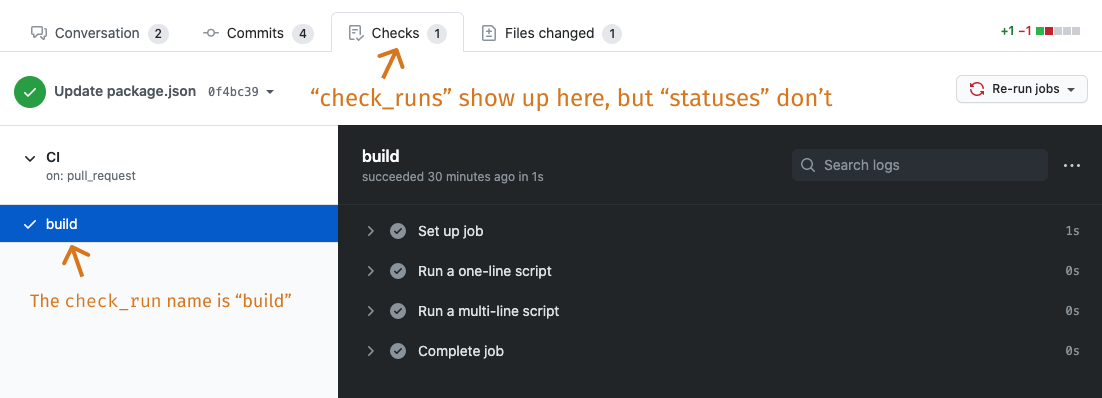Expressions
PullApprove expressions allow you to write powerful, custom rules to design your workflow.
Expressions are evaluated in a Python environment, using the provided functions and variables. You can use human-readable operators like "in", "not in", "and", and, "or".
The same syntax powers the group conditions, overrides, and notification filters.
Single vs multi-line
Most basic expressions can be written in a single line. In YAML, you'll typically want to surround these with single-quotes since you'll have double-quotes inside (or vice versa):
version: 3
groups:
api:
conditions:
- '"API" in title'
When you're comparing lots of values,
it may be easier to write the expression over multiple lines using the > syntax:
version: 3
overrides:
- if: >
not contains_any_fnmatches(files, [
"packages/*",
"apps/*",
"docs/*",
])
status: success
Examples
You can apply the same basic operations to most of the data we make available. Here are some common examples of how to use the available functions and variables.
Files
Basic string comparisons will use fnmatch under the hood.
# (GitHub)
"*.js" in files or "frontend/*" in files
# (Bitbucket)
"*.js" in diffstat or "frontend/*" in diffstat
You can also use the contains_any_fnmatch function to check more paths at once without writing lots of "or" lines.
# (GitHub)
contains_any_fnmatches(files, [
"packages/*",
"apps/*",
"docs/*",
])
# (Bitbucket)
contains_any_fnmatches(diffstat, [
"packages/*",
"apps/*",
"docs/*",
])
Or globs using contains_any_globs:
# (GitHub)
contains_any_globs(files, [
"packages/animations/**",
"packages/platform-browser/animations/**",
"aio/content/guide/animations.md",
"aio/content/examples/animations/**",
"aio/content/images/guide/animations/**",
"aio/content/guide/complex-animation-sequences.md",
"aio/content/guide/reusable-animations.md",
"aio/content/guide/route-animations.md",
"aio/content/guide/transition-and-triggers.md",
])
# (Bitbucket)
contains_any_globs(diffstat, [
"packages/animations/**",
"packages/platform-browser/animations/**",
"aio/content/guide/animations.md",
"aio/content/examples/animations/**",
"aio/content/images/guide/animations/**",
"aio/content/guide/complex-animation-sequences.md",
"aio/content/guide/reusable-animations.md",
"aio/content/guide/route-animations.md",
"aio/content/guide/transition-and-triggers.md",
])
Or a glob() instance:
# (GitHub)
glob("packages/**/*.js") in files
# (Bitbucket)
glob("packages/**/*.js") in diffstat
You can also chain the include and exclude methods to further filter down a list of files:
# (GitHub)
files.include("src/*").exclude("*.md")
# (Bitbucket)
diffstat.include("src/*").exclude("*.md")
Branches
Use branch variables to enable review depending on PR branch names or where it's being merged into:
# (GitHub)
# Reference a hardcoded branch name
base.ref == "master"
# Or another variable
base.ref != base.repo.default_branch
# Or use the standard comparision operators
"feature/" in head.ref
# (GitLab)
# Reference a hardcoded branch name
target_branch == "master"
# Or use the standard comparision operators
"feature/" in source_branch
# (Bitbucket)
# Reference a hardcoded branch name
destination.branch_name == "master"
# Or another variable
destination.branch_name != destination.repository.mainbranch.name
# Or use the standard comparision operators
"feature/" in source.branch_name
Labels
# (GitHub)
# Standard strings
"bug" in labels
# String patterns (fnmatch)
"sig-*" in labels
# Regular expressions
regex('.*/app') in labels
# (GitLab)
# Standard strings
"bug" in labels
# String patterns (fnmatch)
"sig-*" in labels
# Regular expressions
regex('.*/app') in labels
Other PullApprove groups
Use the state of preceding groups (above the current group in your config).
# (All platforms)
# Use list operators
len(groups.approved) > 3
# Or basic logic by name
"admins" in groups.passing
Checks and statuses
The "checks" on a PR come in two forms: the Checks API, and the commit Statuses API.
The GitHub interface often combines these, making it hard to tell the difference.
The best way to tell the difference is to look for the Checks tab on a PR page.
For anything on that page (like GitHub Actions/Workflows), use the check_runs object.
If you have a status that is not on that page, it will be found in statuses.

Checks
# (GitHub)
"build" not in check_runs.failed
Statuses
# (GitHub)
"*travis*" in statuses.succeeded
# (Bitbucket)
"*travis*" in statuses.successful
Title
# (All platforms)
# Use basic string comparisions
"WIP" in title
# Or fnmatch
"WIP*" in title
# Or regular expressions
regex("WIP: .*") in title
Body/description
# (GitHub)
"needs review" in body
# (GitLab)
"needs review" in description
# (Bitbucket)
"needs review" in description
Size
# (GitHub)
changed_files > 30
# (Bitbucket)
len(diffstat.paths) > 30
Author
# (All platforms)
author in ["internA", "internB"]
GitHub also has an author_association variable which can be used (check possible values here):
# (GitHub)
author_association == "FIRST_TIME_CONTRIBUTOR"
# (GitLab)
first_contribution
Mergeability
# (GitHub)
not mergeable
# (GitLab)
# https://docs.gitlab.com/ee/api/merge_requests.html#single-merge-request-response-notes
merge_status == "can_be_merged"
Git diff and files changed
# (GitHub)
contains_fnmatch(files.lines_added, '*dangerouslySetInnerHTML*')
# (GitLab)
contains_fnmatch(diff.lines_added, '*dangerouslySetInnerHTML*')
# (Bitbucket)
contains_fnmatch(diff.lines_added, '*dangerouslySetInnerHTML*')
Dates
# (GitHub)
created_at < date('3 days ago')
# (Bitbucket)
created_on < date('3 days ago')
